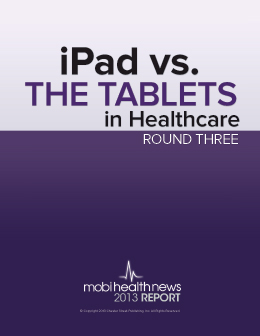 Over the last three years, tablets have taken the world of healthcare by storm. Manhattan Research's "Taking the Pulse" survey saw tablet adoption among physicians rising from 30 percent in 2010, to 62 percent in 2011, to 72 percent in 2012. Adoption will continue to ramp up as the opportunities to use tablets in the hospital increase, not just for doctors but for nurses, hospital administrators, and patients as well.
Over the last three years, tablets have taken the world of healthcare by storm. Manhattan Research's "Taking the Pulse" survey saw tablet adoption among physicians rising from 30 percent in 2010, to 62 percent in 2011, to 72 percent in 2012. Adoption will continue to ramp up as the opportunities to use tablets in the hospital increase, not just for doctors but for nurses, hospital administrators, and patients as well.
MobiHealthNews recently published the third edition of our special report: "iPad vs The Tablets in Healthcare: Round Three." This report includes metrics and survey data, not just about tablet adoption, but also on which tablets doctors use, how they use them, and how effective they find them. We delve into more than a dozen diverse use cases for tablets in the hospital or primary care facility, covering everything from electronic health records, to radiology, to telemedicine and patient engagement. The report looks at general trends as well as specific products and case studies.
As the title suggests, one of the biggest questions for the tablet market is "How long can the iPad dominate?" We found that though the iPad still enjoys great popularity among doctors, many hospital CIOs are less thrilled with the consumer device in an enterprise context, and competitors, with Microsoft chief amongst them, are eager to meet the demand.
It's clear Microsoft has a new tablet-centric strategy, including its new Windows 8 operating system and Surface and Surface Pro tablets. That strategy extends into healthcare, as evidenced by company's strong presence at HIMSS and its many healthcare-related partners. And there are indications that the dedicated medical tablet makers like Motion Computing aren't down and out yet, either. On the other hand, with rumors of an iPad 5 coming out soon, Apple might have a few surprises of its own.
Finally, the new report explores questions about device security in a BYOD tablet world. In many hospitals, physicians use virtualization software to access PC-based EHRs on their tablets, but, as many hospitals have seen, that interface is often hard to use, especially for data entry. Is the future of BYOD better virtualization, or something else entirely, like mobile device management or cloud-based security solutions? Can native applications catch up?
Tablets in healthcare aren't going away. In fact, the list of ways they can empower care providers grows every year, and might grow even faster once the FDA publishes its final guidelines for mobile app regulation, and more developers become comfortable making medical apps.
For a comprehensive overview of the tablets in healthcare trend, check out the MobiHealthNews Research Store to get your copy of "iPad vs The Tablets in Healthcare: Round Three."












